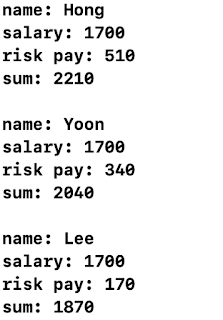C++ 상속 관계의 확장과 추상 클래스
문제
예제 EmployeeManager4.cpp를 확장하여 다음 특성에 해당하는 ForeignSalesWorker 클래스를 추가로 정의해보자.
“영업직 직원 중 일부는 오지산간으로 시장개척을 진행하고 있다. 일부는 아마존에서, 또 일부는 테러의 위험이 있는 지역에서 영업활동을 진행 중에 있다. 따라서 이러한 직원들을 대상으로 별도의 위험수당을 지급하고자 한다.”
위험수당의 지급방식은 ‘위험의 노출도’ 에 따라서 다음과 같이 나뉘며, 한번 결정된 직원의 ‘위험 노출도’ 는 변경되지 않는다고 가정한다(이는 const 멤버변수의 선언을 유도하는 것이다).
- 리스크 A: 영업직의 기본급여와 인센티브 합계 총액의 30%를 추가로 지급한다.
- 리스크 B: 영업직의 기본급여와 인센티브 합계 총액의 20%를 추가로 지급한다.
- 리스크 C: 영업직의 기본급여와 인센티브 합계 총액의 10%를 추가로 지급한다.
다음 main 함수와 함께 동작하도록 ForeignSalesWorker 클래스를 정의하기 바라며, Employee 클래스는 객체 생성이 불가능한 추상 클래스로 정의하기 바란다.
main 함수
int main(void)
{
EmployeeHandler handler;
ForeignSalesWorker* fseller1 = new ForeignSalesWorker("Hong", 1000, 0.1, RISK_LEVEL::RISK_A);
fseller1 -> AddSalesResult(7000);
handler.AddEmployee(fseller1);
ForeignSalesWorker* fseller2 = new ForeignSalesWorker("Yoon", 1000, 0.1, RISK_LEVEL::RISK_B);
fseller2->AddSalesResult(7000);
handler.AddEmployee(fseller2);
ForeignSalesWorker* fseller3 = new ForeignSalesWorker("Lee", 1000, 0.1, RISK_LEVEL::RISK_C);
fseller3->AddSalesResult(7000);
handler.AddEmployee(fseller3);
handler.ShowAllSalaryInfo();
return 0;
}
위의 main 함수에서 보이는 RISK_LEVEL 이름공간의 RISK_A, RISK_B, RISK_C는 enum형으로 선언된 상수이다. 그럼 이어서 실행결과를 보이겠다.
실행의 예

위의 실행결과에서 salary 내역은 일반 영업직 직원의 급여 계산결과이며(기본금에 상여금을 더한 결과), risk pay가 위험수당에 속한다.
EmployeeManager4.cpp 코드
#include <iostream>
#include <cstring>
using namespace std;
class Employee
{
private:
char name[100];
public:
Employee(char* name)
{
strcpy(this->name, name);
}
void ShowYourName() const
{
cout<<"name: "<<name<<endl;
}
virtual int GetPay() const
{
return 0;
}
virtual void ShowSalaryInfo() const {}
};
class TemporaryWorker : public Employee
{
private:
int workTime;
int payPerHour;
public:
TemporaryWorker(char* name, int pay) : Employee(name), workTime(0), payPerHour(pay) {}
void AddWorkTime(int time)
{
workTime += time;
}
int GetPay() const
{
return workTime*payPerHour;
}
void ShowSalaryInfo() const
{
ShowYourName();
cout<<"salary: "<<GetPay()<<endl<<endl;
}
};
class PermanentWorker: public Employee
{
private:
int salary;
public:
PermanentWorker(char* name, int money) : Employee(name), salary(money)
{}
int GetPay() const
{
return salary;
}
void ShowSalaryInfo() const
{
ShowYourName();
cout<<"salary: "<<GetPay()<<endl<<endl;
}
};
class SalesWorker: public PermanentWorker
{
private:
int salesResult;
double bonusRatio;
public:
SalesWorker(char* name, int money, double ratio) : PermanentWorker(name, money), salesResult(0), bonusRatio(ratio) {}
void AddSalesResult(int value)
{
salesResult += value;
}
int GetPay() const
{
return PermanentWorker::GetPay() + (int)(salesResult*bonusRatio);
}
void ShowSalaryInfo() const
{
ShowYourName();
cout<<"salary: "<<GetPay()<<endl<<endl;
}
};
class EmployeeHandler
{
private:
Employee* empList[50];
int empNum;
public:
EmployeeHandler() : empNum(0)
{}
void AddEmployee(Employee* emp)
{
empList[empNum++]=emp;
}
void ShowAllSalaryInfo() const
{
for(int i=0; i<empNum; i++)
empList[i]->ShowSalaryInfo();
}
void ShowTotalSalary() const
{
int sum=0;
for(int i=0; i<empNum; i++)
sum += empList[i]->GetPay();
cout<<"salary sum: "<<sum<<endl;
}
~EmployeeHandler()
{
for(int i=0; i<empNum; i++)
delete empList[i];
}
};
int main(void)
{
EmployeeHandler handler;
handler.AddEmployee(new PermanentWorker("KIM", 1000));
handler.AddEmployee(new PermanentWorker("LEE", 1500));
TemporaryWorker * alba = new TemporaryWorker("Jung", 700);
alba->AddWorkTime(5);
handler.AddEmployee(alba);
SalesWorker * seller = new SalesWorker("Hong", 1000, 0.1);
seller->AddSalesResult(7000);
handler.AddEmployee(seller);
handler.ShowAllSalaryInfo();
handler.ShowTotalSalary();
return 0;
}
풀이 코드
#include <iostream>
#include <cstring>
using namespace std;
namespace RISK_LEVEL
{
enum
{
RISK_A,
RISK_B,
RISK_C
};
}
class Employee
{
private:
char name[100];
public:
Employee(char* name)
{
strcpy(this->name, name);
}
void ShowYourName() const
{
cout<<"name: "<<name<<endl;
}
virtual int GetPay() const = 0;
virtual void ShowSalaryInfo() const = 0;
};
class TemporaryWorker : public Employee
{
private:
int workTime;
int payPerHour;
public:
TemporaryWorker(char* name, int pay) : Employee(name), workTime(0), payPerHour(pay) {}
void AddWorkTime(int time)
{
workTime += time;
}
int GetPay() const
{
return workTime*payPerHour;
}
void ShowSalaryInfo() const
{
ShowYourName();
cout<<"salary: "<<GetPay()<<endl<<endl;
}
};
class PermanentWorker: public Employee
{
private:
int salary;
public:
PermanentWorker(char* name, int money) : Employee(name), salary(money) {}
int GetPay() const
{
return salary;
}
void ShowSalaryInfo() const
{
ShowYourName();
cout<<"salary: "<<GetPay()<<endl<<endl;
}
};
class SalesWorker: public PermanentWorker
{
private:
int salesResult;
double bonusRatio;
public:
SalesWorker(char* name, int money, double ratio) : PermanentWorker(name, money), salesResult(0), bonusRatio(ratio) {}
void AddSalesResult(int value)
{
salesResult += value;
}
int GetPay() const
{
return PermanentWorker::GetPay() + (int)(salesResult*bonusRatio);
}
void ShowSalaryInfo() const
{
ShowYourName();
cout<<"salary: "<<GetPay()<<endl<<endl;
}
};
class ForeignSalesWorker: public SalesWorker
{
private:
const int risk;
public:
ForeignSalesWorker(char* name, int money, double ratio, int risk) : SalesWorker(name, money, ratio), risk(risk) {}
int GetPay() const
{
switch(risk)
{
case 0:
return SalesWorker::GetPay() * 0.3;
break;
case 1:
return SalesWorker::GetPay() * 0.2;
break;
case 2:
return SalesWorker::GetPay() * 0.1;
break;
default:
return 0;
}
}
void ShowSalaryInfo() const
{
ShowYourName();
cout<<"salary: "<<SalesWorker::GetPay()<<endl;
cout<<"risk pay: "<<GetPay()<<endl;
cout<<"sum: "<<SalesWorker::GetPay()+GetPay()<<endl<<endl;
}
};
class EmployeeHandler
{
private:
Employee* empList[50];
int empNum;
public:
EmployeeHandler() : empNum(0) {}
void AddEmployee(Employee* emp)
{
empList[empNum++]=emp;
}
void ShowAllSalaryInfo() const
{
for(int i=0; i<empNum; i++)
empList[i]->ShowSalaryInfo();
}
void ShowTotalSalary() const
{
int sum=0;
for(int i=0; i<empNum; i++)
sum += empList[i]->GetPay();
cout<<"salary sum: "<<sum<<endl;
}
~EmployeeHandler()
{
for(int i=0; i<empNum; i++)
delete empList[i];
}
};
int main(void)
{
EmployeeHandler handler;
ForeignSalesWorker* fseller1 = new ForeignSalesWorker("Hong", 1000, 0.1, RISK_LEVEL::RISK_A);
fseller1 -> AddSalesResult(7000);
handler.AddEmployee(fseller1);
ForeignSalesWorker* fseller2 = new ForeignSalesWorker("Yoon", 1000, 0.1, RISK_LEVEL::RISK_B);
fseller2->AddSalesResult(7000);
handler.AddEmployee(fseller2);
ForeignSalesWorker* fseller3 = new ForeignSalesWorker("Lee", 1000, 0.1, RISK_LEVEL::RISK_C);
fseller3->AddSalesResult(7000);
handler.AddEmployee(fseller3);
handler.ShowAllSalaryInfo();
return 0;
}

댓글남기기